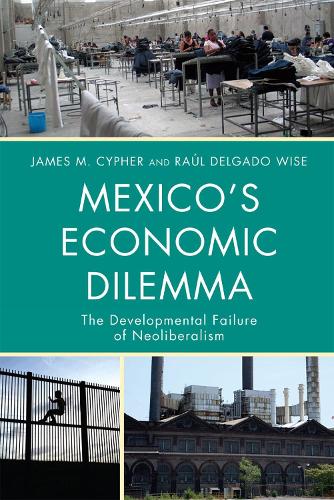
Mexico's Economic Dilemma: The Developmental Failure of Neoliberalism
(Paperback)
Publishing Details
Mexico's Economic Dilemma: The Developmental Failure of Neoliberalism
By (Author) James M. Cypher
By (author) Ral Delgado Wise
Bloomsbury Publishing PLC
Rowman & Littlefield Publishers
10th October 2011
United States
Classifications
Professional and Scholarly
Non Fiction
International economics
Regional / International studies
Politics and government
330.972
Physical Properties
Paperback
226
Width 155mm, Height 232mm, Spine 15mm
363g
Description
Written by two leading scholars, this book provides a detailed analysis of Mexico's political economy. James M. Cypher and Ral Delgado Wise begin with an examination of Mexico's pivotal economic crisis of the 1980s and the consequent turn toward an export-led economy, later anchored by NAFTA. They show how Mexico, after abandoning frequently successful past practices of state-led development, disastrously tied its future to an unconditional reliance on foreign corporations to promote an export-led growth strategy.
Focusing on Mexico's cheap labor export model, the authors use the maquiladora sector and the auto industry as case studies of the perils of globalizationthe "race to the bottom" as capital becomes ever more international. The government's unconstrained free-market policies, they convincingly argue, have resulted in a fragmented economy marked by stagnation, falling wages, informal part-time employment, and massive migration, which define daily life for all but a tiny minority.
Reviews
Cypher and Delgado Wise (development studies, Univ. Autnoma de Zacatecas, Mexico) both earned their PhDs in the US, carry weighty scholarly credentials, and have published numerous books and articles on various topics relating to migration and economic development. Their more recent works have centered on Mexico. This collaboration is an unapologetic critique of neoliberalism, which the authors maintain was swallowed hook, line, and sinker by US-trained policy makers, who had a total disregard for the dangers these strategies posed for Mexico. The analysis is divided into seven . . . chapters (such as export-led growth, NAFTA, and the maquiladoras), the usual suspects when discussing Mexico's relationship with the US. However, the authors expand this view to include discussion of the globalization of capital. Given that both authors are also part of the cohort of US-trained intellectuals living/working in Mexico, it is interesting that they resurrect dependency theory in their analysis. . . . The text is very readable. . . . Summing Up: Recommended. * Choice Reviews *
The book is well written, firmly based on ample and solid empirical evidence, and supported by painstaking field research and a thorough review of the relevant literature. It is an eye opener and a must for anyone who wants to really understand contemporary Mexico's economy and societyand in fact for all those interested in the darker side of the globalization process. -- Osvaldo Sunkel, University of Chile
This is surely the best treatment of modern Mexican economic history and the development of an unending crisis. Mexico's close linking to the United States through NAFTA produced an acute vulnerability to the Great Crisis, and thus Mexico's current condition ought to be an acute embarrassment to the architects of neoliberal globalization. -- James K. Galbraith, The University of Texas at Austin; author of The Predator State
Author Bio
James M. Cypher is a research professor in the doctoral program in development studies, Universidad Autnoma de Zacatecas. Ral Delgado Wise is director of the doctoral program in development studies, Universidad Autnoma de Zacatecas.
